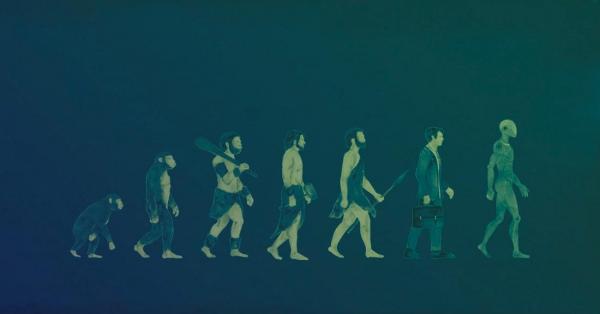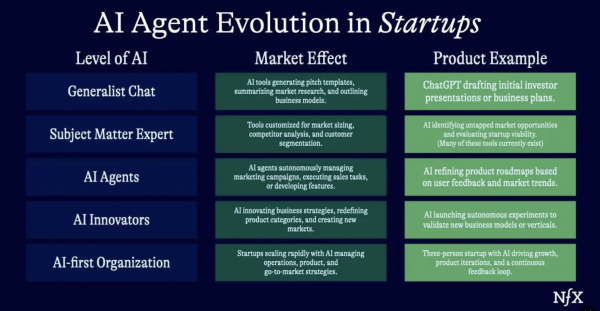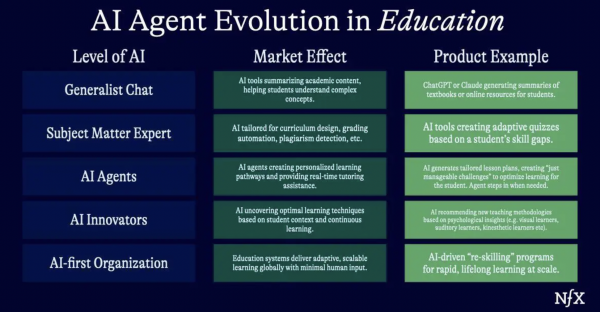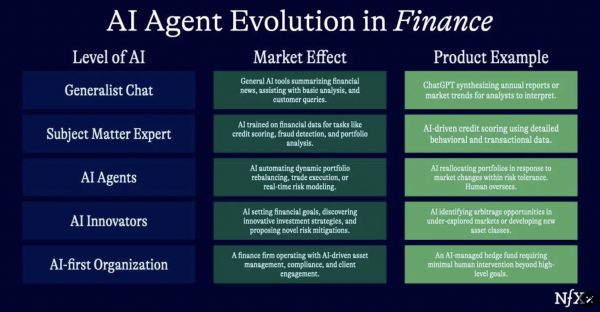AI Agent Evolution: Unveiling the Future of Work Through Five Stages
![]() 02/07 2025
02/07 2025
![]() 512
512
The evolution of AI agents is poised to revolutionize the workplace and startup landscape. Over the past year, AI agent-driven startups have surged, with dozens launching each month.
In Israel, a surge in AI agent startups is evident, focusing on enabling others to integrate and tailor these agents to meet diverse needs across various scenarios.
Leveraging Israel's strengths in cybersecurity, data science, and enterprise software, many of these companies are creating AI agents tailored to solve vertical industry problems, such as medical diagnosis and predictive security. Concurrently, horizontal applications like workflow automation and personalized customer engagement are emerging.
As people explore these AI agent-led startups, they observe common patterns emerging. For instance, startups initially assisted by general AI are transforming into full-fledged "AI organizations."
With each significant advancement in AI agents, we inch closer to a predicted trend: an increasing number of companies relying on AI for automated operations, with humans reserved for key strategic decisions. This momentum has been building for years but now feels like a turning point.
OpenAI's CEO, Altman, predicts that this year marks the true integration of AI agents into the workforce. By 2027, at least half of all companies will have deployed some form of AI agent.
And this is merely the beginning. In the near future, the economy may be dominated by AI-first organizations. To build a resilient company, recognizing this developmental trajectory is crucial.
Perhaps in the future, enterprises will hire AI agents, with humans working alongside or even competing with them. What comes next?
Here are the five potential evolutionary stages of AI agents:

The first wave of AI collaborators comprises foundation models (general LLMs like ChatGPT or Claude). They revolutionize user experience, showcasing AI's vast capabilities. However, AI remains a tool, with humans leading in infusing context, rationality, and empathy.
Early adopters describe these general-purpose tools as "masters without owners," steering AI startups towards the first evolutionary stage. While general AI can read, write, and perform tasks with guidance, it still struggles in hyper-specific industry contexts.
Shortly after the rise of general AI, true AI domain "experts" emerged. These AIs seem capable of solving problems with minimal human prompting. Chat remains the primary interface, but many companies have built additional industry-specific features.
Law is one example, with companies like EvenUp and Darrow demonstrating the power of AI trained on specific legal data corpora. These AIs understand legal nuances and generate professional-grade materials.
Currently, many excellent companies operate at the level of AI domain experts. However, over the past year, there's been a shift from chat-based to action-based value propositions.
General AI tools and domain experts are true "co-pilots," creating new connections, generating articles, or providing new material. Yet, humans must take action for these tools to shine.
Starting in April 2023, AI began performing more advanced tasks. Notable cases include code generation with OpenAI's Code Interpreter or Cognition's AI programmer Devin. This concept extends beyond code generation into more comprehensive "job descriptions."
Now, increasing numbers of AI agents specialize in specific tasks. Packaging and combining these tasks have enormous potential to translate into real services. For instance, Enso, supported by NFX, is pioneering an AI agent marketplace for SMEs.

As AI's ability to complete tasks and take action without significant human supervision continues to refine, there's no turning back. Once AI agents consistently perform tasks, innovative capabilities will soon follow. Allowing AI to generate and explore new knowledge directions will escalate its value to new heights.
Consider how the human brain solves problems and exercises creativity. We have task-oriented "if-then" brain presets but also an active subconscious that kicks in during breaks, leading to effortless problem-solving.
AI innovative agents will engage in this subconscious exploration, unbound by narrow "if-then" logic. Imagine asking AI agents to develop a software feature on Monday and finding them improve upon your initial requirements by Wednesday, based on trial-and-error and market analysis.
When the goal is abstract (e.g., increase sales, improve software performance), planning and charting the path are key to the next stage of AI agent development. This is crucial for AI agents to truly mature as a workforce.
Pure automation without critical thinking addresses low-hanging fruit in the economy but fails to solve the most valuable problems. Creativity does. The key lies in trust: people need confidence in AI agents to make strategic decisions.
Building this trust requires technology, specifically explainability and infrastructure, which could become industries of their own. For example, Maisa, supported by NFX, refines AI agents' "proof of work," crucial for building trust across the ecosystem.
Another NFX-invested company, Emcie, develops the infrastructure for creating ultra-specific AI agents for individuals and businesses. This trust will also develop culturally as people witness AI making intelligent decisions and better outcomes.
Early adopters will be crucial. SMEs or companies unable to hire humans for their needs will take the first steps, and the rest will follow. This will touch all industries, such as education:

With AI agent workers, AI innovation, and systems for trust and explainability in place, the rise of true AI organizations is inevitable. These organizations comprise AI agents and innovators capable of a wide range of actions, akin to AI in science fiction.
In the worst case, you can read about this kind of AI in Daniel Suarez's "Daemon" or Naomi Kritzer's "Improving Life Through Algorithms." These agents can make decisions in complex environments with multiple potential goals, self-selecting the optimal ones and designing paths to achieve them.
AI will handle most actions, with humans working alongside, reviewing, and approving routes. Imagine self-managing supply chains or automated financial trading firms composed of AI agents:

This transformation won't happen overnight but will unfold in stages. As trust and technology evolve, AI will take on larger tasks. Those who understand this are still the builders and enthusiasts driving this change.
Soon, AI-dominated organizations will emerge, ushering in a "ChatGPT" moment. How many truly understood AI's capabilities before ChatGPT? Knowing where we're headed gives you a head start.
In Israel, the AI agent market is booming, with startups leveraging local expertise in machine learning, cybersecurity, and automation. Companies like Enso are building foundational agent platforms for customization.
Startups here are tackling vertical challenges in fintech, logistics, and healthcare, positioning themselves as significant contributors to a rapidly growing AI ecosystem.
AI agents, innovators, and organizations are here. Ask yourself: what's preventing these from entering your field? How can you remove barriers or benefit from their removal?
Not every company should focus on building AI agent infrastructure. But understanding how your field's economic benefits will transform with these new labor pools is crucial.
Consider the psychological impact on your team: managing only AI employees or being managed by AI. At NFX, we study transformative technologies. As technology changes, certain skills become more or less important.
We also navigate psychological changes and address new opportunities. AI agents are in their most exciting nascent stage, a moment when great companies are born.








